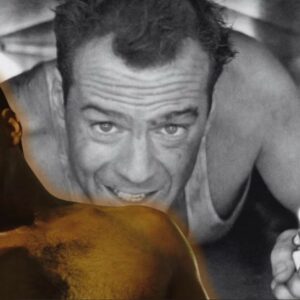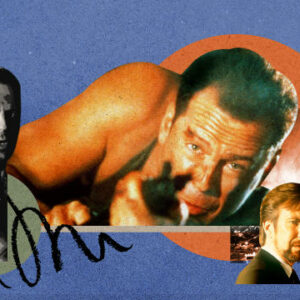Bruce Willis is undoubtedly one of the most recognizable actors of his generation, with a career that spans over four decades and an impressive range of roles across action, drama, and comedy. He has built a reputation for playing characters who are not just tough but also vulnerable, conflicted, and deeply human. From his breakout role as John McClane in Die Hard to the emotional complexity he brought to films like The Sixth Sense, Willis has consistently pushed the boundaries of what audiences expect from an action star. In this article, we will explore some of his most nuanced roles, demonstrating how Willis’s ability to showcase vulnerability, depth, and emotional range has made him a beloved and enduring figure in Hollywood.
The Action Hero with Layers: John McClane in Die Hard
When most people think of Bruce Willis, they immediately picture John McClane, the iconic New York cop who, through sheer grit and determination, saves the day in Die Hard (1988). McClane is the quintessential action hero: tough, resourceful, and seemingly impervious to danger. However, what makes his character stand out is the vulnerability that Willis brings to the role. Unlike many other action heroes, McClane isn’t some infallible, indestructible force of nature; he is a man dealing with personal demons, including a crumbling marriage, isolation, and the weight of his past mistakes.
Willis’s portrayal of McClane is one of the defining moments in his career, laying the foundation for his future roles in both action and dramatic films. McClane’s iconic line—“Yippee-ki-yay, motherfucker”—may be memorable, but it’s the moments when the character is bruised, weary, and questioning his place in the world that give the film its emotional core. McClane is both a hero and a man trying to redeem himself, making him one of the most complex action protagonists of the late 20th century.
This duality in McClane’s character is also what has allowed the Die Hard franchise to evolve over the years. As McClane grows older and more world-weary, his vulnerabilities become even more pronounced, showing that Willis’s portrayal of the character is not confined to just explosive action sequences. The audience feels McClane’s fatigue, his fear for his family, and his struggle to balance his personal life with the demands of his job. In this way, John McClane is a symbol of the Everyman hero, someone who is far from perfect but is willing to fight through his flaws to do what’s right.
The Deeply Haunted Detective in The Sixth Sense
Bruce Willis’s career took a major turn in 1999 with his role as Dr. Malcolm Crowe in The Sixth Sense, a psychological thriller directed by M. Night Shyamalan. Unlike his earlier roles, which often leaned into action or comedy, Crowe is a deeply troubled, emotionally complex character. A child psychologist who is trying to help a young boy named Cole (Haley Joel Osment), Willis’s character is also grappling with his own unresolved guilt over a past failure. The film slowly peels back layers of Crowe’s psyche, revealing his pain, his self-doubt, and ultimately, his redemptive journey.
What makes Willis’s performance in The Sixth Sense stand out is the way he conveys his character’s internal conflict. Crowe begins the film as a man whose life is falling apart. He is disconnected from his wife, still haunted by the memory of a failed case, and struggling with his own professional identity. The gradual realization that he is, in fact, dead and has been throughout the film is one of the most iconic twists in cinema history, but it’s Willis’s subtle performance that makes the revelation so impactful. His eyes, his posture, his interactions with Cole all suggest an inner torment, and it’s in these quiet moments that Willis delivers some of his most powerful work.
The Sixth Sense marked a major turning point in Willis’s career. It showcased his ability to tackle more serious, dramatic material and allowed him to show a level of emotional depth that had not been seen in his previous work. In a sense, the film redefined his image in Hollywood. No longer just the action hero or comedic sidekick, Willis had proven that he could carry a dramatic role with the same intensity and nuance that he brought to his more physically demanding roles.
The Mysterious Time Traveler in 12 Monkeys
In 12 Monkeys (1995), directed by Terry Gilliam, Bruce Willis plays James Cole, a convict sent back in time to prevent a global pandemic that will decimate humanity. This is yet another role where Willis steps away from the mold of the traditional action hero, portraying a character who is caught in a whirlwind of confusion, paranoia, and, ultimately, insanity. The film is a mind-bending exploration of time travel, mental illness, and fate, and Willis’s performance is central to its success.
James Cole is a character who, like McClane, is driven by a sense of urgency and duty, but unlike McClane, his sense of reality is constantly slipping. Cole is unsure of what’s real and what’s a product of his deteriorating mental state. As the film progresses, Willis expertly navigates the fine line between sanity and madness, showing us a man who is both a victim of his circumstances and an agent of change. The emotional vulnerability that Willis brings to the role, particularly in his interactions with the character of Kathryn (Madeleine Stowe), adds a layer of humanity to what could have been a more conventional action role.
Willis’s portrayal of Cole is a testament to his range as an actor. In 12 Monkeys, he steps outside of his comfort zone, playing a character who is deeply flawed, confused, and emotionally vulnerable. The film is a far cry from the typical action fare that Willis had been known for, and yet, it’s a role that fits perfectly within his evolving body of work.
The Retired Hitman in Pulp Fiction
One of the most iconic films of the 1990s, Pulp Fiction (1994), features Bruce Willis in a role that blends both dark comedy and tragedy. As Butch Coolidge, a retired boxer who is forced to return to a life of crime, Willis delivers one of his most memorable performances. The character of Butch is morally ambiguous, struggling with his own sense of honor, his relationship with his girlfriend, and the need for redemption.
What makes Willis’s performance so compelling in Pulp Fiction is his ability to seamlessly balance comedy and drama. Butch’s relationship with his girlfriend, Fabienne (Maria de Medeiros), provides moments of levity, while his confrontation with the crime lord Marsellus Wallace (Ving Rhames) adds tension and gravity to the film. Willis’s comedic timing is on full display, particularly in the scenes where Butch is forced to deal with the absurdity of his situation. At the same time, he brings a quiet intensity to Butch’s moral struggles, showing a man who is trying to find a way out of a world that has long since passed him by.
Pulp Fiction marked another departure for Willis, showcasing his ability to work within the ensemble cast of a film that was as much about the interwoven stories of its characters as it was about the central plot. Willis’s performance is a key part of the film’s success, and his portrayal of Butch Coolidge is a perfect example of how he can bring complexity and depth to even the most unconventional roles.
The Overlooked Father in The Whole Nine Yards
In the dark comedy The Whole Nine Yards (2000), Willis plays Jimmy “The Tulip” Tudeski, a retired hitman who finds himself caught up in a web of deceit, murder, and farcical misunderstandings. The character of Jimmy is a far cry from Willis’s typical roles as an action hero or tortured soul; instead, he is a man who operates in morally gray areas, and his emotional vulnerability is revealed through his interactions with others.
What sets Jimmy apart from other characters Willis has played is his ability to maintain a tough exterior while still revealing a more sensitive, conflicted side. He may be a hitman, but he’s also a man who is trying to live a quieter life and who ultimately shows a capacity for redemption. The film allows Willis to display his comedic chops, as well as his ability to delve into more complex emotional territory.
Conclusion: A Testament to Range and Depth
Bruce Willis’s career is a testament to the actor’s remarkable range and depth. While he may be best known for his portrayal of action heroes like John McClane, his body of work encompasses a vast array of characters, each one showcasing a different facet of his talent. From the vulnerable detective in The Sixth Sense to the time-traveling convict in 12 Monkeys, Willis has consistently pushed the boundaries of what it means to be an action star. His roles are never one-dimensional; they are layered with complexity, emotional depth, and a profound sense of humanity.
What makes Bruce Willis such a compelling actor is his ability to seamlessly move between genres while still maintaining the core of his unique persona. Whether he is saving the day in Die Hard or struggling with personal demons in The Sixth Sense, Willis brings a depth to his characters that makes them resonate long after the credits roll. His career is a shining example of how an actor can evolve and redefine themselves, continuously surprising audiences with their versatility and emotional range.





